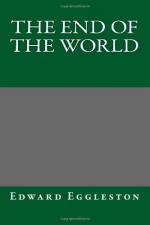[Illustration: A NICE LITTLE GAME.]
After a good deal of fluent talk, and much dexterous handling of the cards, in a way that seemed clear enough to everybody, and that showed that everybody’s guess was right as to the place of the ace, the near-sighted gentleman, who had drunk with Norman, offered to bet five dollars.
“Five dollars!” returned Parkins, laughing in derision, “five dollars! Do you think I’m a gambler? I don’t want any gentleman’s money. I’ve got all the money I need. However, if you would like to bet the wine with me, I am agreed.”
The near-sighted gentleman declined to wager anything but just the five dollars, and Parkins spurned his proposition with the scorn of a gentleman who would on no account bet a cent of money. But he grew excited, and bantered the whole crowd. Was there no gentleman in the crowd who would lay a wager of wine for the company on this interesting little trick? It was strange to him that no gentleman had spirit enough to make the bet. But no gentleman had spirit enough to bet the wine. Evidently there were no gentlemen in the company.
However, the near-sighted man with the white hat adorned with crape now proposed in a crusty tone to bet ten dollars that he could lift the ace. He even took out a ten-dollar bill, and, after examining it, in holding it close to his nose as a penurious man might, extended his hand with, “If you’re in earnest, let’s know it. I’ll bet you ten.”
At this Parkins grew furious. He had never been so persistently badgered in all his life. He’d have the gentleman know that he was not a gambler. He had all the money he wanted, and as for betting ten dollars, he shouldn’t think of it. But now that the gentleman—he said gentleman with an emphasis—now that the gentleman seemed determined to bet money, he would show him that he was not to be backed down. If the young man would like to wager a hundred dollars, he would cheerfully bet with him. If the gentleman did not feel able to bet a hundred dollars, he hoped he would not say any more about it. He hadn’t intended to bet money at all. But he wouldn’t bet less than a hundred dollars with anybody. A man who couldn’t afford to lose a hundred dollars, ought not to bet.
“Who is this fellow in the white hat with spectacles?” August asked of the mud-clerk.
“That is Smith, Parkins’s partner. He is only splurging round to start up the greenies.” And the mud-clerk spoke with an indifference and yet a sort of dilettante interest in the game that shocked his friend, the striker.




